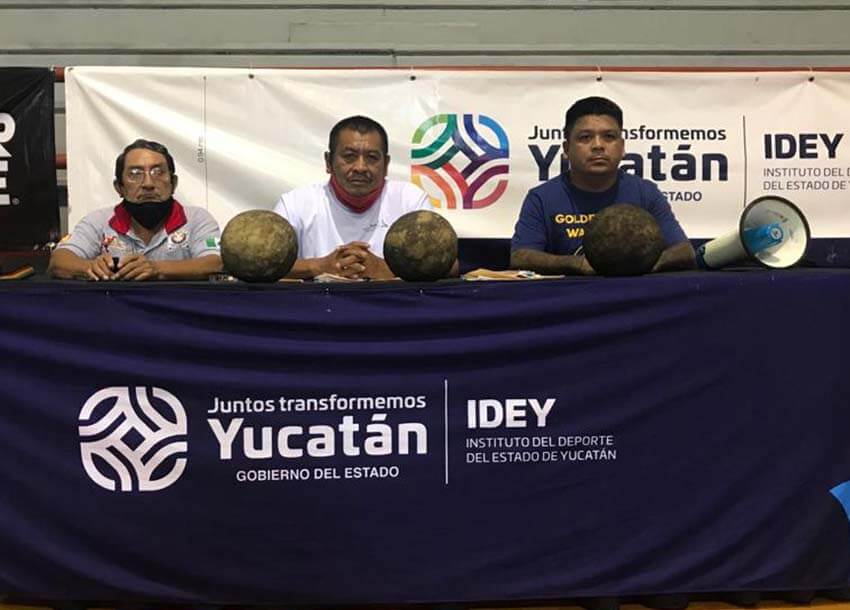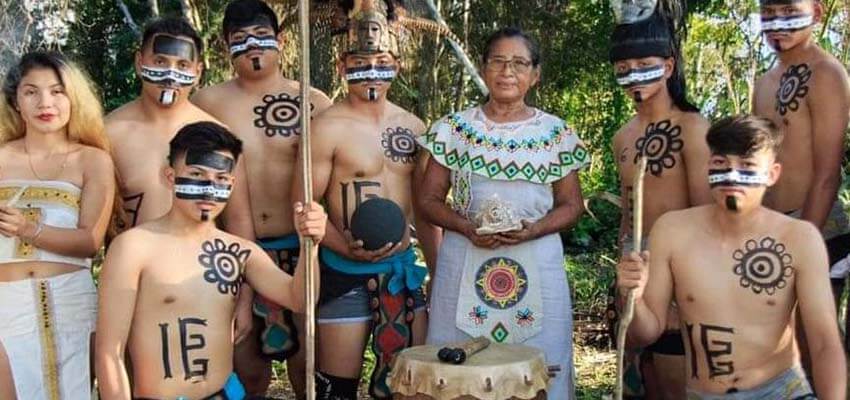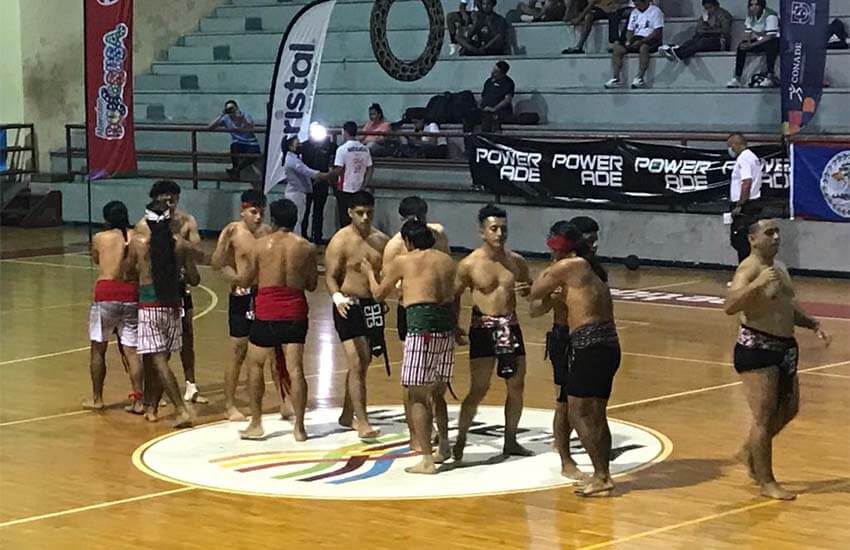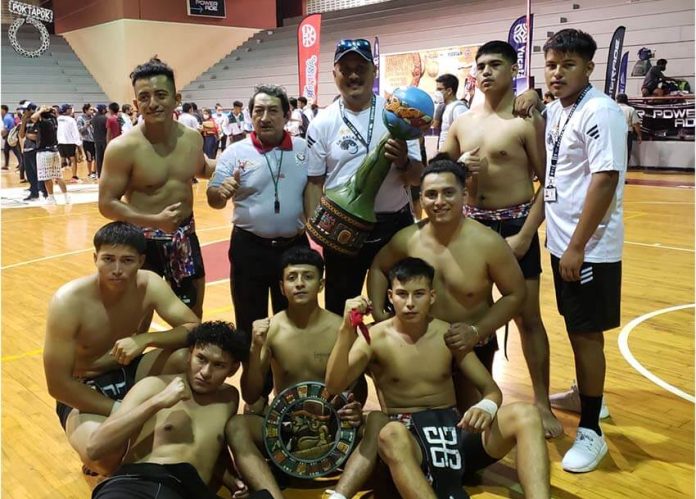Just outside of the historic center of Merida, Yucatán, an ancient Mayan ball game — pok-ta-pok — saw its fourth World Cup final won by Belizean team Ek’ Balam. But in terms of the teams’ unified ultimate goal — to revive this sport played by the ancient Maya — they were all winners.
Seven teams competed on December 2 and 3 to be the world pok-ta-pok (also known as pelota Maya) champions. The tournament, held at the Yucatán State Institute for Sports, brought teams together from countries across Mesoamerica, including Mexico, Guatemala, Honduras and Panama.
Three of these championships have already been played since the modern-day version of the sport began to be played in Maya communities — in Guatemala in 2017 and in El Salvador in 2019 and the inaugural one in 2015 here in Mexico at the Chichén Itzá ruins in Yucatán. Organizers have revived the game as an engaging way for Maya all over Mesoamerica — but especially youth — to connect with pride in their heritage and to bond with members of their community.
The game rules are relatively straightforward: for every time that a team gets the ball over their opponents’ end zone, five points are awarded. Points are also deducted for foul play.
In the court’s center hangs a hoop that, if players can achieve the impressive feat of passing the ball through it, usually affords 10 points. For the finals, however, if the ball passes through the hoop, the game is won regardless of the points scored by the opposing side.

Spectators, however, should take heed: the game commands the full attention of its spectators with its blink-and-you’ll-miss-it pace.
The drums beat loud and fast as the games commence. There are no timers; no scoreboards to help keep track of proceedings. Instead, points are designated by a panel of judges courtside, and the winner is announced at the game’s end.
As the game gathers momentum, it becomes clear that there is a veritable artfulness in the way the players throw themselves on the floor; freeze the gameplay and the players would look as if they were reclining with one hand to the floor and one leg extended perpendicular to the action.
Even the floor maneuvers, however, do not quite parallel the grace of the aerial leaps these players take. Seemingly suspended in the air, they thrust their hips, straighten their legs and send the ball in a curving parabola back toward the other team.
As he watches, Menalio Novelo, manager and coach of Ek ‘Balam, possesses a calm reserve: his celebrations when his team scores points are composed, and he coaches the team with a practiced hand. Off the pitch, he is all smiles and enthusiasm, speaking keenly about the fifth pok-ta-pok international cup, which Belize will host in the city of Orange Walk in 2023.
Asked how the sport was initially received in Belize, Novelo recalls that, despite the prominence of Mayan culture in the traditions of the region, the game was not at first received with enthusiasm.

“It has been a challenge to encourage participation,” he says, “because the population of Belize is very small — only 400,000 people. Initially, we did not get much support from the government, though lately, we’ve seen an improvement in that area.”
Such challenges are ongoing in the sport, even as it gains traction across Mesoamerica. There is a clear need for a recognition of the sport as part of national and international heritage and a need for dedicated spaces in which to play. It is a question of reviving a sport that had seemed lost — as well as supporting indigenous culture.
Indeed, Felicita Cantun, founder of the Belizean team, derives her love for the sport from a history that runs blood-deep in the people who play pok-ta-pok. “I have my culture in my DNA,” she says. “It is in my veins.”
She explains that when she was young, she used to read about the ancient Mayan culture, including pok-ta-pok, though she did not watch it played until 2003. “After that, I had a vision of bringing this game to life — we have proof that it was played in Belize, so it is our heritage.”
And her role in the growth of pok-ta-pok in Belize?
“I am the founder of the team; I recruited these boys,” she says with a grin. “When I first spoke to my family about finding players in Yo Creek, they said, ‘Tu estás loca! [You’re crazy!],’ but now they see that my dream has been realized.”

Novelo and Cantun’s hard work is evident in their team’s impressive track record: it came in third in 2015 after a mere two months of training and took the title of champions in both 2017 and 2019.
“Having the youth on board is essential for the future of pok-ta-pok,” says Cantun. “I think our ancestors would be proud that we are helping to grow this game in Belize once again.”
And proud they certainly would be: at the day’s end, the Ek’ Balam team had won the final game of the tournament against Mexico, 34 to 10, to become the pok-ta-pok world champions.
After the game ended, the opposing sides lined up to shake hands. Despite competing against one another, they were united in their efforts to breathe new life into the sport — and to pass on their cultural heritage to the young people of the Mayan world.
Indeed, before the tournament game commenced, three boys were playing on the court with a smaller version of the pok-ta-pok ball — youths who could be future cup finalists playing Mesoamerica’s oldest ball game beneath the ouroboros (a snake eating its own tail that is part of several ancient cultures, including Mayan). It is an emblem for eternal cyclical renewal.
An apt symbol for a game that has survived millennia of change and is fighting to drag itself out of obscurity through Mesoamerica’s youth.
Shannon Collins is an environment correspondent at Ninth Wave Global, an environmental organization and think tank. She writes from Campeche.
